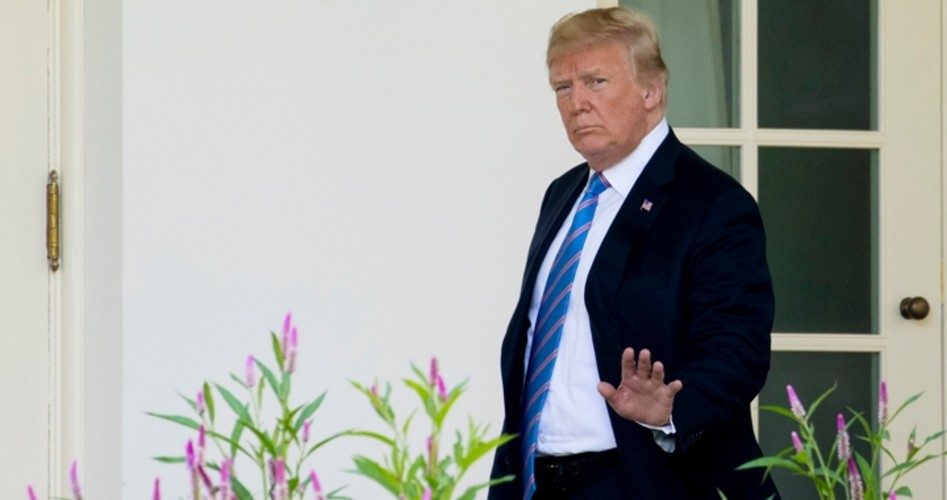
The media’s hysteria over President Trump’s meeting with Russian President Vladimir Putin continues today with a headline in the Washington Post telling us that White House officials “scramble for clarity” because Trump and Putin made “verbal agreements.”
Yet a leftover from yesterday, by Jill Colvin of the Associated Press, might not have gotten the attention it deserved: “Tumult of Trump’s Europe trip smashes presidential precedent.”
The “president’s tumultuous trip across Europe, historians say, smashed the conventions of American leaders on the world stage,” young Colvin explained.
She quoted William Pomeranz, deputy director of the Kennan Institute at the Wilson Center, who said “we’ve never had a president go abroad and not only lecture to our NATO allies, but also to embarrass them,” or a president “categorize our allies as foes” or a president “hold a joint news conference with a Russian leader where he assigned blame, from his perspective, to both parties, but in fact dedicated most of his time to blaming the U.S. Justice Department and intelligence services.”
True perhaps, but then Colvin tried to teach some history. And failed.
Trump Treason Implied
Trump’s latest alleged “failure” was saying that Putin had assured him that Russia did not meddle in the election in 2016, and that he believed Putin rather than his own intelligence agencies.
As The New American reported yesterday, Trump uttered these admittedly imprudent remarks: “My people came to me. They said they think it’s Russia. I have President Putin; he just said it’s not Russia. I will say this: I don’t see any reason why it would be.”
But Trump claimed he misspoke, and that me meant to say, “I don’t see any reason why it wouldn’t be Russia.”
“It was a stunning comment from an American president,” Colvin opined in the news story.
Then readers of the Washington Post got this: “While past presidents have had difficult foreign trips and been criticized for their summits with Soviet leaders, Trump’s behavior has few parallels, in the view of presidential historians and longtime Russia watchers.”
After a rundown of past presidential summits, which included the curious locution that FDR “was accused of ‘selling out’ to Joseph Stalin at the Yalta Conference,” Colvin duly noted the opinions of those “longtime Russia watchers”:
“Frankly, I don’t think those U.S. presidents at any point came off as not pursuing U.S. security interests, as being taken in by the Soviet leader they were meeting with,” said Alina Polyakova, a foreign policy fellow at the Brookings Institution.
Then came presidential historian Douglas Brinkley: “Just standing and selling your country downriver on foreign soil in front of your adversary — there’s no precedent for such disgraceful and irrational behavior.”
Bad History
Problem is, Colvin apparenlty doesn’t know enough history, apparently, to correct the record or even understand that Trump’s relationship with Putin, or his remarks about the Russian leader, are nothing new for an American president.
According to Roosevelt and Stalin: Portrait of a Partnership, by Susan Butler, FDR and Stalin “bonded,” as the Christian Science Monitor put it, “by making fun of an annoyed Churchill, and Stalin even teases FDR by acting offended to learn he’s called ‘Uncle Joe’ behind the scenes.”
FDR bonded with a mass murderer? They were “teasing” each other?
Then there’s Harry Truman, the man who vaporized two cities in Japan with atomic weapons. He thought Stalin was “honest” and “smart as hell,” and the two men got along famously, as the Washington Post helpfully reported on July 17.
“I like Stalin,” Truman wrote in a July 29, 1945, letter to his wife. “He is straightforward, knows what he wants and will compromise when he can’t get it.” Even better, “I got very well acquainted with Joe Stalin, and I like old Joe! He is a decent fellow. But Joe is a prisoner of the Politburo.”
FDR and Truman said all these things as Stalin’s secret agents were penetrating the highest levels of British intelligence and the United States government.
President Eisenhower met with Nikita Khrushchev and so did President Kennedy, and President Nixon met with Leonid Brezhnev and Mao Tse-tung. Communist butchers all, but past presidents didn’t hesitate to meet with them and raise a glass in a toast. President Reagan and Soviet Premier Mikhail Gorbachev became warm friends.
As for presidents who undermine the United States while abroad, where Trump supposedly “attacked” our allies, Barack Hussein Obama attacked his own country. “American has shown arrogance,” he said at the Summit of the Americas in 2009. The same year, he apologized for the times “we went off course,” and for “our own darker periods in our history” and so on. It was called the Obama Apology Tour.
So is what Trump did really so unique?



